So Where Do We Get Our Ideas?
From time to time, in keeping with our motto “all things writing,” we do a group post on some writing-related topic. This month, the topic is “Where Do We Get Our Ideas” and the answers may prove fascinating.
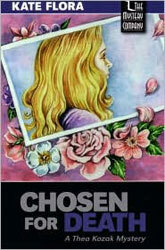 Kate Flora: Story ideas are everywhere. In the papers, on the news, in snippets of overheard conversation. I often refer readers who ask me this question to the origin story of my first published mystery, book one in my Thea Kozak series, Chosen for Death. The story was inspired by an Ann Landers column. Someone had written to her, saying that when she was young, she’d become pregnant and the boy didn’t want to marry her. This was in a time when unwed pregnancy carried a huge stigma. Her family sent her to a home for unwed mothers, and she gave the baby up for adoption. At the time, she was told that this was her secret, and she should go on to make a life as though this had never happened. She subsequently married to a man who didn’t know about the baby, and had a family. They had become prominent citizens in a conservative community. Now she had been contacted by a woman who said she was her daughter and she didn’t know what to do. The letter had everything–someone with a secret who didn’t want to be found. An adopted girl search for her birth parents. My story would be about the girl, who is dead at the beginning of the story. I needed a protagonist who would investigate the death–and along came Thea, the big sister who had loved little Carrie from the moment her parents brought the baby home.
Kate Flora: Story ideas are everywhere. In the papers, on the news, in snippets of overheard conversation. I often refer readers who ask me this question to the origin story of my first published mystery, book one in my Thea Kozak series, Chosen for Death. The story was inspired by an Ann Landers column. Someone had written to her, saying that when she was young, she’d become pregnant and the boy didn’t want to marry her. This was in a time when unwed pregnancy carried a huge stigma. Her family sent her to a home for unwed mothers, and she gave the baby up for adoption. At the time, she was told that this was her secret, and she should go on to make a life as though this had never happened. She subsequently married to a man who didn’t know about the baby, and had a family. They had become prominent citizens in a conservative community. Now she had been contacted by a woman who said she was her daughter and she didn’t know what to do. The letter had everything–someone with a secret who didn’t want to be found. An adopted girl search for her birth parents. My story would be about the girl, who is dead at the beginning of the story. I needed a protagonist who would investigate the death–and along came Thea, the big sister who had loved little Carrie from the moment her parents brought the baby home.
Matt Cost: Ideas are everywhere. They float through the air, call out as they drift by, and demand to be recognized. Many of my ideas come from contemporary news stories. Mind Trap is about cults and was inspired by a group of heavily armed men arrested on Highway 95 in Massachusetts on their way to Maine. Further research led to the knowledge that there are numerous cults out there and we usually don’t know about them until there is a disaster like Jonestown or Waco. Mouse Trap is based upon Jackson Laboratories in Bar Harbor. Through a technology known as CRISPR, they are altering the DNA in the embryo of mice in an effort to eradicate disease in human beings as we share 98.6% of the same DNA as mice. In other words, the ability to make super babies exists. Cosmic Trap was the result of Congress creating a task force to investigate unidentified aerial phenomena due to overwhelming evidence that there was unknown aircraft operating above us in the skies. Ideas can also be events and people that intrigue me. Joshua Chamberlain and the Civil War (At Every Hazard), Fidel Castro and the Cuban Revolution (I Am Cuba), and the fight for social equality in New Orleans during Reconstruction (Love in a Time of Hate). My Brooklyn 8 Ballo series began with me wanting to combine my love of histories and mysteries into a historical PI mystery.
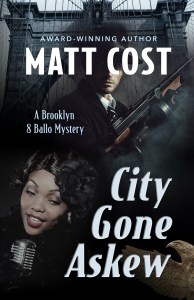
The second book in that series, City Gone Askew, just came out. This plot on the Eugenics Movement in the 1920s Brooklyn was inspired by my research into genome editing in contemporary times for the book Mouse Trap. Mainely Mayhem will pub in November and is centered around sketchy nominations, confirmations, and behavior by Justices of the Supreme Court. Hm. When looking for an idea, it is like picking apples in the fall, just reach out and pluck a ripe and juicy one and bit in. Write on!
Kait Carson Oh, this is almost too juicy a question. In grade school we were required to use our spelling terms in sentences to prove to the teacher we got the meaning and the spelling. The boy next to me (still a friend these sixty plus years later) had the word “clues.” His sentence, “I keep my clues in the clues closet.” The teacher didn’t laugh. Everyone else did. My inspiration is everywhere, and I have notebooks and computer files to back that statement up. My version of the clues closet.
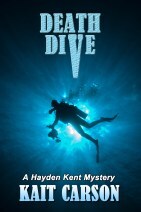 My diving stories come from real life experiences. Death By Blue Water had it’s inspiration in a scuba dive on a deep wreck named the Thunderbolt. A plastic bag floated on the current in the the windows of the wheelhouse. In that moment, it looked like a hand waving. At 80 feet. I plotted a rough outline on the ascent line. Death Dive also grew from my diving life. I was asked to review a video of a dive in which a diver disappeared in Belize’s Blue Hole. The body was never recovered. It’s hard to accept you’ve witnessed someone’s last moments. That turned into a story of attempted insurance fraud.
My diving stories come from real life experiences. Death By Blue Water had it’s inspiration in a scuba dive on a deep wreck named the Thunderbolt. A plastic bag floated on the current in the the windows of the wheelhouse. In that moment, it looked like a hand waving. At 80 feet. I plotted a rough outline on the ascent line. Death Dive also grew from my diving life. I was asked to review a video of a dive in which a diver disappeared in Belize’s Blue Hole. The body was never recovered. It’s hard to accept you’ve witnessed someone’s last moments. That turned into a story of attempted insurance fraud.
Rob Kelley Like my fellow Maine Crime Writers, I find ideas everywhere. Many of mine come from the news or from strange inspirations that hit me at odd times. My forthcoming novel Raven (High Frequency Press, 2025) has as a central plot device a particular piece of software from the early 1990’s that got its programmer very publicly fired from their job. My next book was very much ripped from the headlines today, a fact that has its own challenges as I’ve written about before, when the the headlines end up getting get ahead of your story!
And like most of my colleagues, I have an idea file that I’ve kept for years. Not a clippings file, per se, but the contemporary version of one, a cloud-based document filled with ideas and website links to news stories or other research sources. Also in that file are weird things that have happened to me or to friends and acquaintances that would make interesting stories (one I haven’t written yet, but absolutely will, will draw on the experience of having to clean out a long-estranged friend’s apartment after his suicide).
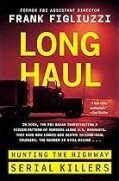 And some of the notes in that idea file are just odd phrases that strike me as kernels for a story, like the comment by Frank Figliuzzi in an interview in a recent Crime Reads about his new book on serial killers hiding as long haul truck drivers, Long Haul: Hunting the Highway Serial Killers. When one of the folks he interviewed in the book asked to be identified by an alias, he agreed, since “serial killers tend to be unpleasant.” That line is in my idea file. Not quite sure what that story is going to be about, but it’s dynamite!
And some of the notes in that idea file are just odd phrases that strike me as kernels for a story, like the comment by Frank Figliuzzi in an interview in a recent Crime Reads about his new book on serial killers hiding as long haul truck drivers, Long Haul: Hunting the Highway Serial Killers. When one of the folks he interviewed in the book asked to be identified by an alias, he agreed, since “serial killers tend to be unpleasant.” That line is in my idea file. Not quite sure what that story is going to be about, but it’s dynamite!
Maureen Milliken: At the risk of being repetitive, most writers are sponges. Ideas come from everywhere — an overheard snatch of conversation, something you spot while driving down the street, something you read in the newspaper. Feelings can lead to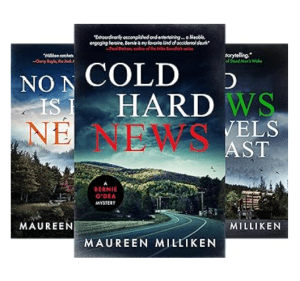 ideas, too. Frustration at an injustice, watching something play out that could’ve happened a different way — these have been foundations for all of my books in the Bernadette “Bernie” O’Dea mystery series.
ideas, too. Frustration at an injustice, watching something play out that could’ve happened a different way — these have been foundations for all of my books in the Bernadette “Bernie” O’Dea mystery series.
A writer’s mind, at least mine, is always saying “What if?” I don’t go through one day where something doesn’t give me an idea. Most days, I have many. My advice to aspiring writers? Be curious. Be observant. Look at the world around you in a different way. The ideas are everywhere, just waiting for you to pick them up.
John Clark: Story ideas are everywhere–pieces of overheard conversations, spotting unique visages on the street, pieces mined from obituaries, dreams, random thoughts, questions that pop into my mind, even things like the plethora of potholes in our street.
Lea Wait's Blog
- Lea Wait's profile
- 506 followers



